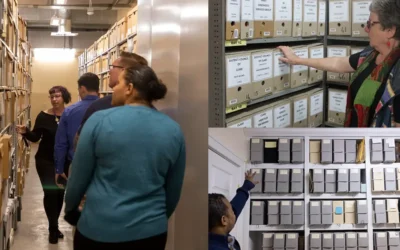Authenticity, Reliability, Integrity, and Usability
Margot Note
To effectively create and capture records, archivists need to decide on several issues at the organizational or business process level. Of the documentation being created, what needs to be captured as a record?
How will the records of a transaction be linked together and separated from the records of other transactions? In addition, archivists will need to know whether all the records of a specific transaction will be subject to the same management and retention rules and, if not, how different rules will be imposed.
Archivists also consider the authenticity, reliability, integrity, and usability of records. Are these concepts absolute, or should they be applied well enough based on business needs and risk? What do these terms mean in the organization? Are these concepts applied at the organizational level, the business process level, the records series level, or the item level?
Recordkeeping Capabilities
The authenticity, reliability, integrity, and usability of records depend on the recordkeeping capabilities of the system in which they are created and managed. What requirements should be applied to systems that keep records? Are the requirements the same for all systems, or should they again be applied in a “good enough” fashion, based on business need and risk?
For example, the documentation may consist of emails asking about availability and proposing meeting times, Outlook calendar meeting notices and responses, emails concerning meeting logistics, drafts of the agenda (some circulated and some not), notes and drafts of the meeting itself, comments and corrections to the draft minutes, and the official meeting minutes. An organization with an established archives and records management program should know which documents need to be retained as official meeting documentation and whose responsibility it is to do so.
Everyone agrees that email messages can be records, yet very few have done anything to ensure that they can demonstrate the authenticity, reliability, integrity, and usability of their email messages. There are several reasons why. For example, employees are unsure what a record is in email, but they know that not everything is a record, so they do not know how to handle that. In addition, there are few specific requirements to keep email. However, when there are clear and specific requirements, such as those outlined in Sarbanes Oxley, they take steps to meet the requirements.
Individual employees may see rewards in managing email for their use, but most organizations do not see email as an information asset. Everyone understands that managing email will take resources, and without a solid reason to do so, they see no reason for investing. Without specific requirements, many organizations do not see significant risks that necessitate implementing recordkeeping for email. Most organizations assume that the essential transactions are managed officially outside of email or in another system. The one risk people are aware of is discovery, which leads them to keep everything or as little as possible.
In short, email contains records, but its management continues to be uneven and will be until the risks and rewards reach a point where they need to be addressed. Is this sufficient management? In typical records management and archives fashion, one would answer, “It depends.”
Sufficient Trust
In most organizations, employees have sufficient trust in the authenticity and reliability of their email system that they conduct at least a percentage of their business over it. Many email messages are records of transactions between individuals, not organizations. Agreements that obligate organizations are still managed through paper or systems that have a much greater capability to ensure the authenticity and reliability of the records. Finally, most organizations do not appreciate the wealth of information available in their email system. Those who try to move the useful information to another platform rather than manage it by email.
Records managers and archivists have definitions of authenticity, reliability, integrity, and usability, but most organizations consider those legal terms, not archives and records management terms. Authenticity, reliability, integrity, and usability are the characteristics of a record. The purpose of archives or records management policies, practices, guidelines, and procedures are to ensure that records should maintain these characteristics as long as necessary.
Margot Note
Margot Note, archivist, consultant, and Lucidea Press author is a regular blogger, and popular webinar presenter for Lucidea, provider of ArchivEra, archival collections management software for today’s challenges and tomorrow’s opportunities. Read more of Margot’s posts here.
Never miss another post. Subscribe today!
Similar Posts
Navigating Selection in Archival Practice
The archival selection process is far from straightforward, given the limitations of long-term preservation and ongoing accessibility challenges.
Responsible Stewardship in Archival Practice
Responsible stewardship is a philosophy that guides the actions and decisions of archivists in safeguarding collective memory.
A Modern View of a City’s History via ArchivEra
Brief success story on City of Regina Archives’ use of ArchivEra to manage collections of legal, historical, administrative or financial significance
Stewards of the Past, Guardians of the Future
Archival preservation bridges the past and future, allowing the voices and stories of bygone eras to resonate with contemporary and future audiences.
Hosting service
Enjoy all of the benefits of your Lucidea solution with secure, reliable, stress free hosting
Programs & incentives
No matter your size or budget, we’ve got you covered, today and tomorrow




Leave a Comment
Comments are reviewed and must adhere to our comments policy.
0 Comments